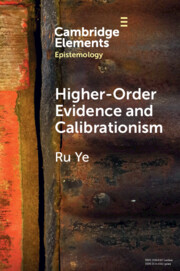Element contents
Higher-Order Evidence and Calibrationism
Published online by Cambridge University Press: 23 December 2022
Summary
- Type
- Element
- Information
- Series: Elements in EpistemologyOnline ISBN: 9781009127332Publisher: Cambridge University PressPrint publication: 26 January 2023
References
- 8
- Cited by



